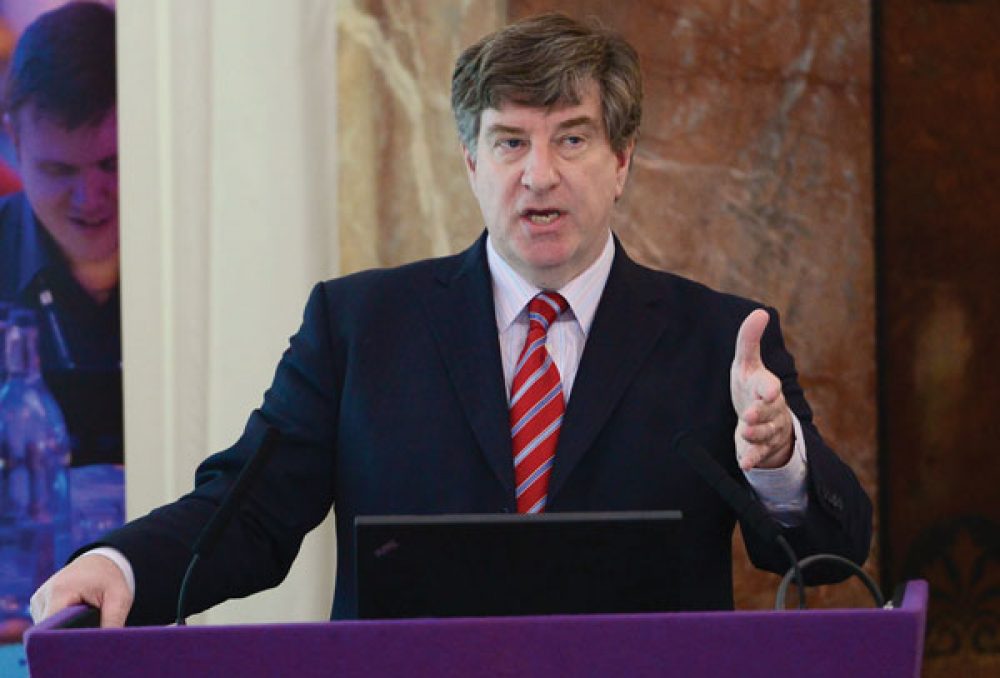Sir David Carter, the national schools commissioner, has said the new £140 million strategic school improvement fund proves the government’s intentions have shifted from “mass conversion to mass improvement”.
The Department for Education announced the pot of funding on Wednesday, which Carter explained today will go towards four targeted issues.
Carter said the cash aims to create “less patchy” coverage of multi-academy trusts (MATs) and teaching school alliances (TSAs); launch more high quality training routes for teachers in challenging areas; make sure curriculum ideas such as “mastery” consistently enter all classrooms; and allow faster intervention when schools are failing.
Speaking to delegates at the annual SSAT conference in Birmingham this morning, Carter said the millions of pounds of funding in the “current climate” was “fairly unprecedented.”
He also said a review of difficulties for local authorities supporting maintained schools – after a £600 million cut in the Education Services Grant – had led to a further £50 million-a-year fund in that area.
“I think this is a really interesting message around our shift from mass conversion to mass improvement, which has to be the right thing.”
The £140 million is intended to “make the biggest impact for schools that are in the most difficulty”. Explaining about the four themes, the former headteacher and regional school commissioner for south-west England said: “The first is around system capacity.
“When I said earlier about the spread of good and weak schools, this is what this part will address. This will enable us to continue to grow teaching school alliances, continue to grow national leaders of education and continue to support and develop existing and new high quality multi academy trusts. That’s going to be the system capacity.”
MATs had proven themselves to deliver “school alliances at their best” and would be key in bringing a wider and more consistent spread of teaching school alliances, Carter said.
“Now MATs and teaching school alliances are not the same, and you know that as well as I do. But the school alliances at their best are the delivery arm of MATs, whether inside them or working across several, and we need to do more of that.”
Curriculum “best practice” would also be targeted, since the notion of “best” was subjective and required a more rigorous focus on the actual efficacy of classroom methods, said Carter.
“It’s great to be able talk about the Shanghai maths or Singapore experience or phonics, or maths mastery, or music hubs and that’s great – but so what? How do we get that to make a difference in every classroom in the country. And that curriculum theme will help us with that.”
Carter said he “welcomed the most” extra funding to intervene where Ofsted placed a school to special measures, given the lengthy processes currently in place which he said could slow rapid turnaround.
Schools Week has previously revealed how “unattractive” schools have been denied transformative takeovers after issues converting into academies or finding a new sponsor – many down to issues with private finance initiative deals.
Carter added: “When an academy, which is my remit, goes into special measures on a Thursday, I want to be able to support it the following Monday morning.”
“And at the moment, as we go through the school-to-school support round, it takes too long. So having access to that rapid intervention means that those children in those schools should get the opportunity to find themselves in schools that are improving more quickly.”
Aside from the £140 million strategic school improvement fund, a further £50 million would go towards local authorities to monitor and commission support for underperforming maintained schools.
“We’ve acknowledged that local authorities have a difficult and different challenge, when the white paper produced in April and the removal of ESG (education services grant) meant that their support for their own schools, those schools that are not yet good enough, would have been challenging.
“So we’ve placed a grant for the next two years with local authorities, to continue to monitor and commission support for their weakest schools.”
A further £20 million of support from the Education Endowment Fund (EEF) had also been pledged to “scale up and disseminate evidence-based programmes.”








Well, thanks a bunch, David. How very generous of you to brush a few crumbs off the academies table in the direction of local authorities. I wonder whether you’ve had time to reflect on HMCI’s annual report which noted that “At their most recent inspection, 90% of primary schools were found to be good or outstanding. In my first Annual Report, that figure was 69%.” Only 18% of those schools are now academies. What on earth is the point of stealing £600 million from local authorities who are responsible for the vast majority of those successful schools, unless it is to force schools down the academies route?
Someone isn’t very good at maths. How is cutting £600m and then putting back £190m providing extra funding. It’s still a massive and unjustified cut in the money available to support school improvement. The vast majority of primary schools and a sizeable number of secondary schools remain maintained by local authorities which are being starved of the resources to help them.